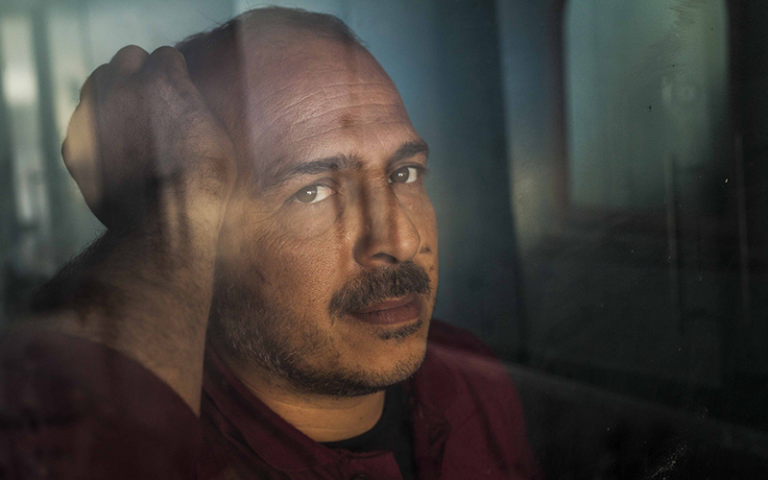Vulnerable older people more likely to experience depression and anxiety during pandemic
5 May 2021
Older people who were clinically vulnerable to COVID-19 were at greater risk of deterioration in health and social well-being during the pandemic, according to a new UCL-led study.

Research published today in the Journal of Epidemiology and Community Health found that they were more likely to report worse health outcomes than those with no clinical vulnerabilities, including greater depression and anxiety and lower quality of life, even when taking into account pre-pandemic levels of health and social well-being.
The findings highlight the need for policymakers to consider the mental and physical health consequences of the pandemic for those at higher risk from coronavirus, particularly for those asked to shield.
Study lead author, Dr Giorgio Di Gessa, (UCL Department of Epidemiology and Public Health) said: “While policies focusing on shielding clinically vulnerable older people reduce rates of hospitalisation and death from COVID-19, policymakers need to acknowledge that there may be adverse consequences of this measure and address the wider needs of these vulnerable groups.
“So far, the focus has been on containing the spread of the disease and saving lives by encouraging shielding and social distancing of the most vulnerable people. However, it’s vital that policymakers are aware that when advised to stay at home, a host of health and social risks for this group, already poor, are likely to be exacerbated.”
The researchers looked at the English Longitudinal Study of Ageing and compared data from the first COVID-19 sub study (June/July 2020) with previous data from 2018/19. They analysed responses from 5,585 people aged 52 and over in private households in England.
Respondents were classified as clinically vulnerable if they had a chronic lung disease, asthma, coronary heart disease, Parkinson’s disease, multiple sclerosis, diabetes, a weakened immune system as a result of cancer treatment in the previous two years or were severely obese.
Health outcomes included respondents rating their own health as poor, doing less physical activity, depression and anxiety. As measures of social well-being, the authors considered loneliness, lower levels of social contacts, and receipt of care, among others.
As of July 2020, 39% of respondents were classified as clinically vulnerable, with a higher prevalence found in older age; older people, widowers and those in more deprived socioeconomic positions (low educational qualifications, lowest wealth quintiles and income) were more likely to be classified as clinically vulnerable. Overall, just under a third (29%) of clinically vulnerable respondents in the COVID-19 sub study reported that they were shielding, compared with only 1 in 12 (8%) among those with no clinical vulnerabilities.
As well as investigating associations between clinical vulnerability and health and social well-being during the pandemic, the team explored the impact on different age groups (categorised as 52-59, 60-69, 70-79 and 80+) and on those who were shielding.
The study revealed that during the pandemic respondents classified as clinically vulnerable were more likely to report poor self-rated health, lower levels of physical activity, depression, anxiety, lower quality of life as well as loneliness and receipt of care, compared to those without clinical vulnerabilities. This was true within each age group; among people in their 70s, the odds of being depressed and anxious for those clinically vulnerable were around 50% higher than for those without clinical vulnerabilities. Those in their 80s, regardless of clinical vulnerability, were much more likely to have unmet care needs and to have little contact with friends and family by text, email, or videocall.
Although older adults’ health and social well-being have been impacted by shielding, the researchers found that it was those who were clinically vulnerable and shielding who reported the most substantial rises in anxiety, depression, poor self-rated health and receipt of formal care as well as decreases in well-being and physical activity.
Study co-author, Professor Debora Price (The University of Manchester), said: “Older people with underlying health conditions, even before the pandemic, faced challenges in terms of access to healthcare services and social contact; they also experienced greater emotional distress, higher risk of loneliness and poorer quality of life than non-vulnerable individuals. Coming out of the pandemic, more needs to be done to ensure that the long-term health and social well-being of these individuals are not compromised.”
Links
- Full study in the Journal of Epidemiology and Community Health
- Dr Giorgio Di Gessa's academic profile
- UCL Department of Epidemiology and Public Health
- Faculty of Population Health Sciences
- Professor Debora Price's academic profile
- The University of Manchester
Image
- Credit: Talip Özer on Pixabay
Media contact
Evie Calder
Tel: +44 20 7679 8557
E: e.calder [at] ucl.ac.uk
 Close
Close

